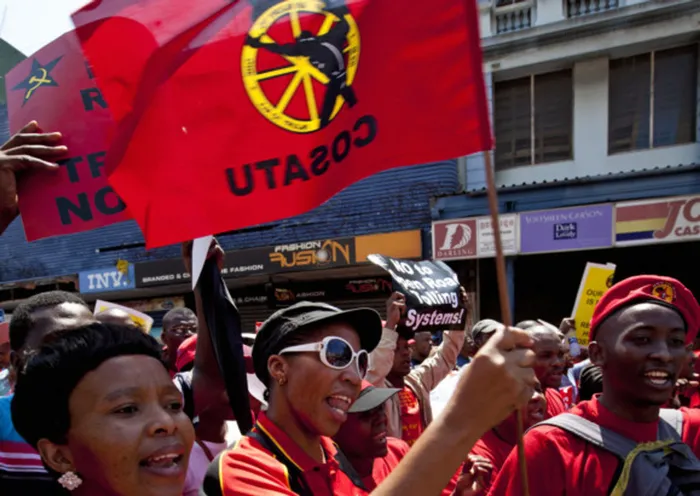
Striking members of the Congress of South African Trade Unions (COSATU) march through the Durban city centre in this file photo. Striking members of the Congress of South African Trade Unions (COSATU) march through the Durban city centre in this file photo.
The dark side of labour broking was discussed yesterday when employees told of their experiences of a system that Cosatu wants abolished.
One Ekurhuleni woman claimed she was dismissed after she sustained injury while on duty. She didn’t receive any compensation. Others said that, as temporary employees hired through labour brokers, they enjoyed no constitutional rights as workers.
These comments were heard at a media briefing by Cosatu in Joburg yesterday ahead of Parliament voting on the future of labour broking.
Cosatu’s second deputy president, Zingiswa Losi, expressed her organisation’s rejection of labour broking.
“That is why we make no apology for calling it human trafficking and a modern form of slavery. We cannot agree with the government that increased regulation of the labour broking industry will stop all its abuses. The Department of Labour can’t enforce current regulations of employment conditions and safety, let alone adding another area of enforcement,” she said.
Palesa Mogotsi described her harsh working conditions, at a Joburg pharmaceutical distribution company where she has worked since 2008.
“I work night shift and the rule is you can’t go home until your job is finished, and there’s no payment for overtime. I get a meagre R2 800, which is nowhere near what I need to cover my responsibilities,” she said.
Another worker, Celiwe Mahlangu, said she had worked as a casual for the Tupperware plastics company in Brakpan for years and was dismissed after she sustained an injury on duty.
“I slipped and fell on March 2011 and injured my right hand. I waited until the end of my shift before I arranged my own medical care,” she said.
Mahlangu said that as time went by she never received calls for casual work at the company and was never paid compensation for her injury.
Cosatu said agreeing to regulate labour broking would not be enough.
“(Regulating) will still lead to major abuse (as) firms will be able to keep rotating workers hired from labour brokers for a three-month period and then replace them with others.
“While (labour brokers) get rich through this trade in labour, the workers are exploited worse than ever, since a hefty proportion of what should have been paid out in wages and benefits goes into the fee to the labour brokers,” Losi said.
She added that client companies would be absolved of their obligations under the labour laws and could not be charged with unfair dismissal because they were not the employers of the workers.
They also don’t have any responsibility to ensure that the workers receive the wages and benefits they are entitled too.
These companies she said don’t have to pay for UIF, medical aids or pension funds.
Cosatu said it would continue to engage the ANC on the matter.
“Our struggle for a total ban goes on and we will mobilise even greater numbers onto the streets until we put an end to this barbarous practice of labour broking,” Losi said. - The Star